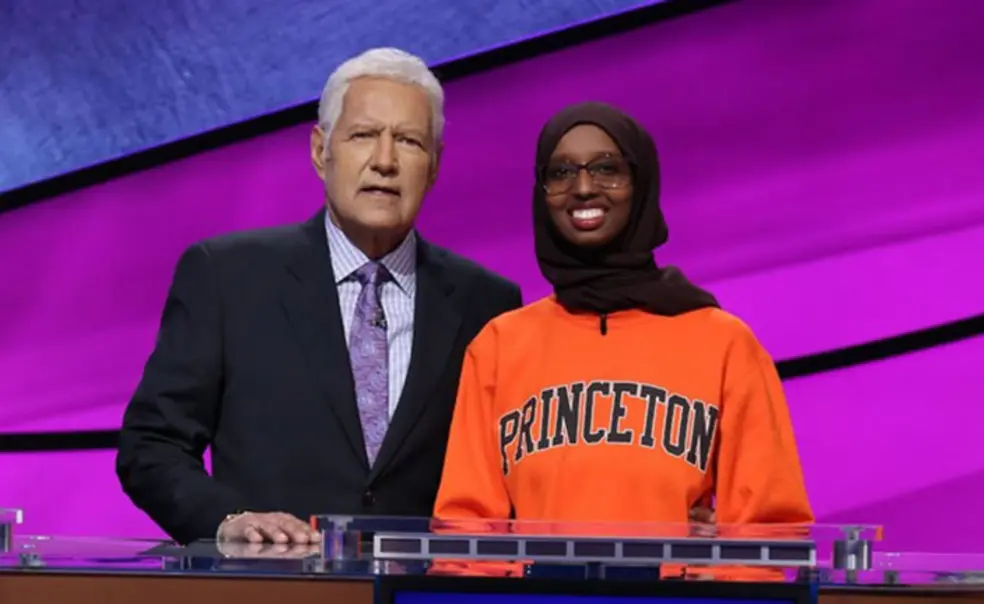Sirad Hassan ’20 Explains How Maps and Almanacs Led Her to ‘Jeopardy!’
“I checked off a life dream of mine and I still can’t believe that happened,” Hassan said
As a child, Sirad Hassan ’20 had a placemat with the U.S. presidents on it. Each mealtime, Hassan recalled, she would study the order. More than a decade later, that mat helped her get a question right as a contestant on this year’s Jeopardy! College Championship.
Hassan’s episode was taped in February in front of a live studio audience and aired April 6 (she finished third). PAW spoke with Hassan about the experience.
What first sparked your interest in trivia? When did you set your sights on Jeopardy!?
My parents would watch Jeopardy! at home, all the time. So, growing up, it's always been in the back of my mind. When I was in middle school there was a game show called It's Academic where high school students could compete. I looked at maps for fun and read books with lists and almanacs, and I remember I felt this sense of pride whenever I’d watch the show and get a question right that the high schoolers couldn’t. Once I was in high school I signed up for the school's It’s Academic team. I was on these shows and participating in tournaments. It’s just something that I really enjoyed. So for me, Jeopardy! seemed like a natural step.
When did you first apply to be on the show?
The first time I took an online test, I was a senior in high school. Like a month later my dad got an email that we were invited to come to an audition in New York. I thought I did pretty well on the written test. There’s [also] a personality interview and a practice game. But I didn’t hear back from the teen tournament. This time, I was very meticulous in preparing. I was invited to a Philadelphia audition in November. I asked people for advice this time around (including Gilbert Collins *99, who was previously on the show). It was Dean’s Day when I found out I got it.
How did you prepare for the tournament?
I was very nervous because I know that the college tournaments are heavy on pop culture and sports. I asked friends and my family to send me quizzes and things to do online. It was difficult to fully prepare since it was during finals week. I got a few books to review, like Shakespeare, and I reviewed capitals of countries and states and a lot of geography. I also asked friends to send me facts about sports. I reviewed a lot about the NBA and the NCAA. So it was just a kind of random process.
What was it like to watch yourself on TV?
I was anticipating that watching my game would be very stressful for me, considering that there were quite a few questions that, looking back, I could have definitely gotten right. It was very different because I watch the show all the time and now it’s like wow, there’s an actual episode that I’m in. I checked off a life dream of mine and I still can’t believe that happened.
What’s your analysis of your performance?
My general impression of the game was that I thought it was a lot more difficult than a lot of the other college tournaments I had seen. I just feel like because the game is so fast paced, there was a lot of decision-making. The categories were just not my strong suits. I was definitely playing a very cautious game. I tried my best and I felt pretty satisfied watching it.
What was your favorite part of the experience?
It just felt really nice to have fulfilled the experience of being on the show. There’s a lot more insight that I got from this experience and I’m very happy about that. Another thing that I am really grateful for are the people who were my competitors. We all exchanged information and started a GroupMe where we talk. We’re all also part of a Jeopardy! alumni group where people do trivia together on Zoom, have hangout sessions, and just talk in general.
How did it feel to represent Princeton, especially as a woman of color?
That felt really nice because when people think of schools like Princeton and other predominantly white institutions, who I am and what I look like is not the image that the person would get. People had reached out to me from the Somali community to say, “Wow it’s so great to see a Muslim woman wearing a hijab on the show representing an Ivy League [school].” Even though I did not win my episode, what I did get was even more powerful. I just hope it inspires young kids who look like me to see this as something they could do.
Interview conducted and condensed by Carlett Spike












No responses yet